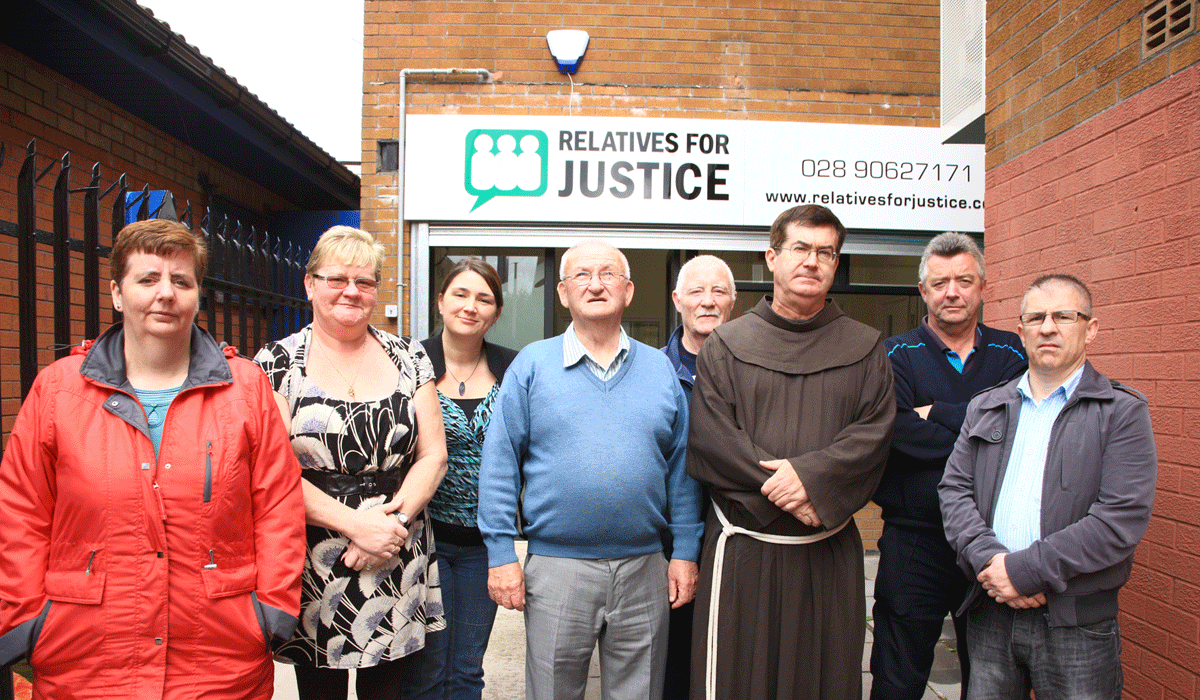VictimS’ group Relatives for Justice have welcomed New York Franciscan priest Fr Brian Jordan to their offices, to hear at first hand how families who have lost loved ones at the hands of the British Army continue to struggle for truth and justice.
During his visit, Fr Jordan met with Patsy Mullan, the brother of Fr Hugh Mullan, who was shot and killed during the Ballymurphy Massacre in 1971. Patsy spoke about his brother and his campaign for justice.
Fr Jordan also heard from Jimmy Dougal, whose 16-year-old brother John was shot dead during the 1972 Springhill Massacre.
“When the state takes life then the threshold of accountability must be higher and this must equally be so concerning the planning and ordering of such actions,” Jimmy said. “Accountability was especially required of those responsible in the aftermath for ensuring that the killers were never brought to justice. The challenge is now to ensure that the truth is uncovered and that justice is delivered to the families.”
Stan Carberry told Fr Jordan that the killing of his father, also known as Stan, in November 1972, had a profound effect on his family circle.
“I was only eight years old and the oldest of seven. My father was shot at close range in the back with his hands in the air after being ordered out of a car he was in. For our mother’s sake, our family simply want truth and accountability.”
Joe and Margaret Simpson explained how their brother Seamus was gunned down by the British Army in Andersonstown in August 1971 during disturbances in which it had been claimed that Seamus had been in possession of a blast bomb. Joe and Margaret told how they have spoken to witnesses about the incident and with the support of RFJ have now established that Seamus did not have a blast bomb as was claimed. They also stressed to Fr Brian their need for truth and accountability.
Margaret Kennedy told Fr Jordan of the shooting of her mother Maura Meehan and her aunt Dorothy Maguire in October 1971 in Cape Street in the Lower Falls area by the British Army and the subsequent lies told to the media that the car they were passengers in contained gunmen and had fired on the British Army.
Margaret recalled how photos subsequently exposed the true story and that there was no gun residue found in the car or on the bodies to support the bogus claims. Margaret described how her family were regularly harassed by the British Army and the RUC after the killings and told of how her late father was subjected to beatings.
After listening to the victims’ experiences, Fr Jordan spoke of his own human rights work in El Salvador and Guatemala, drawing comparisons to military executions and massacres that had taken place there. He explained his work in El Salvador and the quest for justice in the case of the murder of four nuns, linking this to the killings of Fr Mullan in Ballymurphy in August 1971 and Fr Fitzpatrick in Springhill the following year. He also spoke of the important role that the Church must play in this work.
Fr Brian said that his visit was a “very humbling and sobering experience” and added that he intended raising the matter of legacy when he returned to the US and at the upcoming New Belfast New York event in New York.
RFJ Deputy Director Andrée Murphy told Fr Jordan that the processes for dealing with the past needed to be independent and robust, particularly when dealing with actions that were carried out by the state.
“For too long these families have endured the suppression of the facts, perfunctory processes that conceal the facts rather than exposing them and we have a situation whereby these families, supported by RFJ, have to do the investigative work themselves, which is unacceptable.”



